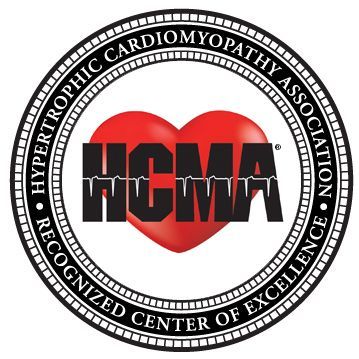
It may feel overwhelming to learn about this new diagnosis or figure out how to “adjust the sails” to manage your HCM if things are changing. The HCMA is here for you – you are not alone! Besides the information in this newsletter and on our website, you can contact us for an Intake and Navigation Call or, if you have already spoken with us, an Update Call. Either way, sign up with Intake first and let us know if you need a new intake or an update: https://4hcm.org/education-and-support/. If you are outside the US, you can request a Zoom call to save on long-distance call costs.
I have HCM; now what?
Breathe! On average, we live as long as anyone else when we properly care for our HCM. We are more likely to get good care at a high-volume center – a Center of Excellence. The American College of Cardiologists and the American Heart Association guidelines for HCM agree about high-volume centers.
HCM is characterized by thickening of the heart muscle (hypertrophy means “a thickening of muscle fibers”). Even with minimal thickening, though, we can have symptoms due to stiffness of the heart muscle and other factors caused by myocardial disarray, which means that the heart muscle cells aren’t lined up normally. For more information, follow this link: https://4hcm.org/newly-diagnosed.
You can find great support in our Discussion Groups and on Facebook. Remember that those of us seeking support from the Facebook group are most often those with more problems related to HCM. If you are newly diagnosed, you can learn a lot from the group, but you may be alarmed by what some of us are going through. Just know that your HCM may not be as dire as some of the accounts you read online. Most people have a few symptoms that are easily managed with medications. The group is private, and you will find excellent peer support if you become a member.
You may develop new symptoms over time – don’t panic!
HCM symptoms can stay the same for a patient’s lifetime, but for many of us, things change. Some will develop an arrhythmia – an irregular heart rhythm that may be concerning or may just be annoying. Obstruction can increase over time, causing new symptoms or more intense symptoms. For these reasons, it is vital to be followed regularly by your HCM specialist. You might need a change of medications or other treatment to improve your quality of life. The HCMA can help you understand your latest test results, organize your thoughts so you know what to ask your doctor, or help you find a new team to manage your care. We are here for you, so don’t hesitate to contact us !
The post Are you newly diagnosed with HCM, or have your symptoms recently changed? appeared first on Hypertrophic Cardiomyopathy Association.
HCMA Blog


 Translate
Translate